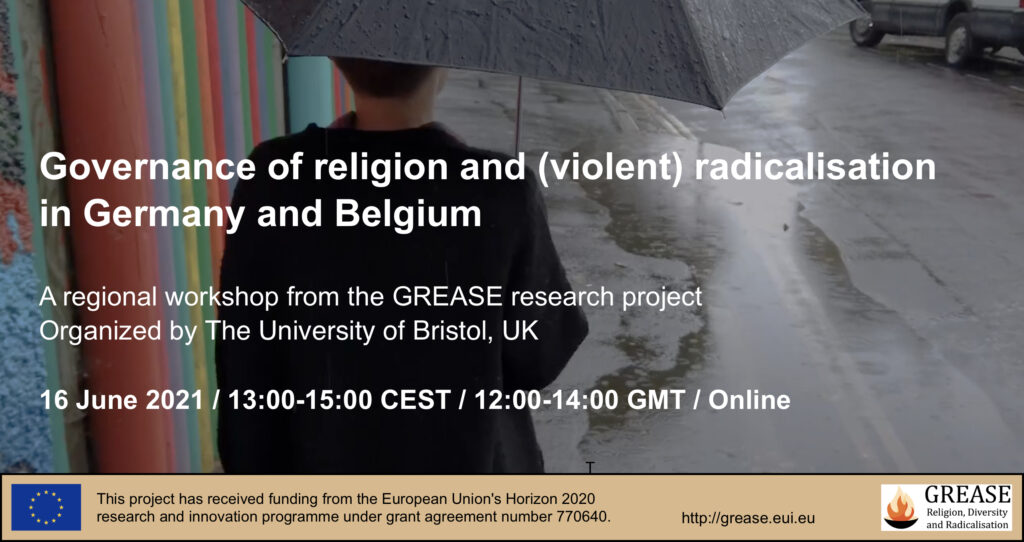Workshop completed. A recording is available. Please send requests to Valentina.Bettin@eui.eu
16 June 2021 / 13:00 – 15:00 CEST / 12:00-14:00 GMT / Online (Zoom)
A GREASE Regional Workshop / Organized by University of Bristol (UK) / Technical Host: European University Institute (EUI) – Florence, Italy

Two-step registration:
1. Create account with EUI or log in to existing account
2. Sign up for workshop
Background
Questions about the capacity of Western European countries to fully integrate and accommodate extra-Christian religious diversity have been brought into sharp relief in recent decades as issues of religiously attributed radicalisation have come to the fore in these countries in relation to and with a focus on Islam and Muslims. Attacks targeting capital cities were given a further dimension when nationals of countries began traveling as ‘foreign fighters’ to take part in the wars in Syria and Iraq, with Belgium seeing the highest number of leavers per capita in the EU, and the return of these fighters has more recently become a significant issue.
Nevertheless, along with radical Islamism, more recently attention has also turned to radical Christian-identarianism, especially that associated with the far-right, which targets minorities and especially Muslim minorities in a refusal of the accommodation and belonging of these minorities. While this has been evident across the region of Western Europe (as well as beyond), this has been a particular focus in Germany, which has experienced comparatively few violent Islamist related attacks but increasing extreme right-wing attacks aimed at (religious) minorities.
Workshop Focus
This workshop will focus on the two country cases of Germany and Belgium in order to illuminate the particular challenges and approaches in each. Both feature state-religion connections and both have also been accommodative of religious diversity and sought to institutionalise minority religions within existing systems and structures, while also facing particular challenges in doing so. Furthermore, a particular aspect of responses in these countries, as well as more widely, in responding to violent radicalisation has been increased regulation and interference over religious (mainly Muslim) institutions and organisations. We see, for example, extra conditions placed on Muslim organisations and mosques in institutional relations and recognition with the state, and also how security concerns creep into social and welfare work.
Key Questions
Questions then arise about the link between forms of governance and policies that address security and those that address religious diversity and how one is affecting and being affected by the other. Amongst other questions, we can ask, for instance:
- How do features of existing governance frameworks (such as institutional arrangements and prevention programmes) serve the purpose of security-focused measures or change to meet them? And if new forms and measures of governance are brought in, what does this mean for the wider picture of the governance of religious diversity?
- Are countries that are accommodating of religion and religious diversity in the public sphere more or less likely to contain religiously-inspired radicalisation? Alternatively, are these countries also more or less likely to contain far right Christian-identarian radicalisation?
- How can state-religion relations be developed in ways that contribute to bringing radical elements into more democratic forms of engagement?
This workshop will address these overarching issues through the presentation of research results that bring together the two arms of the GREASE project, the governance of religious diversity on the one hand, and religiously-attributed or inspired radicalisation on the other.
PROGRAMME
General introduction
Tariq Modood, Professor of Sociology, Politics and Public Policy and founding Director of the Centre for the Study of Ethnicity and Citizenship at the University of Bristol, UK
Thomas Sealy, Research Associate, GREASE project, School of Sociology, Politics and International Studies at the University of Bristol, UK
Findings from the GREASE research project
Tariq Modood and Thomas Sealy
Response 1
Tobias Cremer, Junior Research Fellow in Religion and the Frontier Challenges at Pembroke College, Oxford, UK
Response 2
Corinne Torrekens, Researcher at Fonds de la Recherche Scientifique (FNRS) and at Centre METICES, Université libre de Bruxelles (ULB), Brussels, Belgium
Response 3
Olivier Roy, Chair in Mediterranean Studies at the Robert Schuman Centre for Advanced Studies at the European University Institute, Florence, Italy
— Final 40 min. Q&A and closing remarks–
